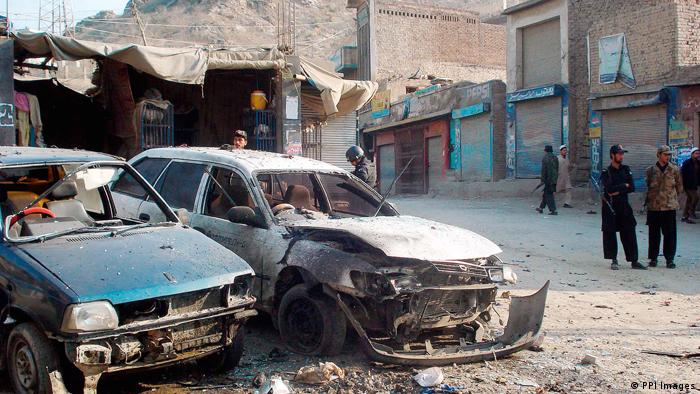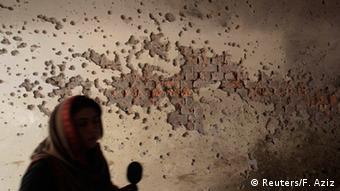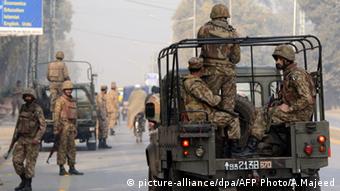By Naomi Conrad
They report on suicide attacks, drone strikes and torture, and give the victims a voice. But who listens to the war correspondents? A unique trauma center in Peshawar offers them a place to turn to.
He can't erase the memories of the first suicide attack he witnessed, the journalist says. It was some ten years ago when a young man blew himself up in front of a village school. The journalist ran towards the building as soon as he heard the explosion. "Blood and body parts were everywhere," he says. He pauses, looking down at his hands, and swallows. "There was a brown satchel lying on the ground. And next to it, a severed hand." His voice is hoarse and barely audible. "It was such as tiny hand."
The journalist is now 34 years old. His beat is the tribal areas of northwestern Pakistan, a rugged region that for many years was a safe haven for Al Qaida, drug lords, and Afghan and Pakistani Taliban. Reporting from the tribal areas means documenting an endless string of suicide attacks, drone strikes, kidnappings and torture. But reporters themselves can and do become targets.
Many have received death threats from extremists, for example. "The stress is enormous," says the correspondent, who asks to remain anonymous. He has spent the last 15 years reporting from the tribal areas for international print media. During that time 13 of his colleagues have died, many of them murdered.
Traumatized correspondents
Given the circumstances, is independent reporting possible in the tribal areas? He shrugs. If you want to survive you don't tell every story and sometimes you don't tell the whole story, he says. "No story is worth dying for." Many reporters in the tribal areas suffer from psychological problems. "Most of us have pills in our pockets," he says grimly. Others try to drown their trauma in alcohol - at least for a few hours. He has seen how work like this can gnaw away at a person. Many of his friends and colleagues have become aggressive, others argue with their families or have trouble sleeping.
He admits to having some psychological issues himself, but it's not something he wants to talk about. Instead, he gestures to the cigarette he's holding in his hand, saying it's another way to numb oneself. When he comes home in the evenings, he's quiet. "I can't tell my wife and children what I've seen," says. "It wouldn't be fair to them."
Counseling and support
Anxiety, depression, nightmares and flashbacks - the psychologist Erum Irshad recognizes the symptoms. She heads the University of Peshawar's psychology department and together with colleagues and DW Akademie opened the first trauma center for Pakistani journalists in November 2014. Irshad says journalists require about 15 to 20 sessions to ease some of their symptoms and to learn techniques that can better shield them from future traumas.
Forty journalists have undergone therapy so far, and with psychological problems still seen as taboo in Pakistani society the center is considered a great success. "I didn't think the reporters would accept their trauma so quickly and that they'd be so motivated to recover," Irshad says. She adds that she's very pleased when reporters who have been treated here recommend the trauma center to other colleagues.
An extremely dangerous profession
Altaf Khan, head of the university's journalism department, believes the center is incredibly important for Pakistan's media environment. He sets his teacup down on a table in the cluttered editorial office of the university's radio station. The department accepts some eighty students per year and Khan grimly estimates that as many as seventy of them will at some point in their careers suffer from trauma. Journalists in the tribal areas are at great risk, he adds, and given the current conflict that's not likely to change any time soon. "But thanks to the trauma center they'll at least have a place they can turn to," he says.
The center also offers an important contribution to human rights work, says Karin Schädler, DW Akademie's country coordinator for Pakistan. "Freedom of expression can only be ensured if correspondents are psychologically strong enough to provide people with independent information," she says. An additional counseling center is being planned in Baluchistan province, and is based on the Peshawar experience. This long-term project is funded by Germany's Federal Ministry for Economic Cooperation and Development (BMZ).
From the university's tree-lined campus it's only a few kilometers to the tribal areas. Sometimes at night, one can make out the dull, menacing thud of explosions. The journalist is smoking a cigarette with a few colleagues and says he's considered getting counseling himself. "Maybe," he adds, grinning. And then he becomes serious again. The attacks, kidnappings and death threats haven't stopped, he says, and there will always be a need for reporters to cover the tribal areas. "Who else will report on the people living there?" he asks. "Who else will tell their stories?"




No comments:
Post a Comment